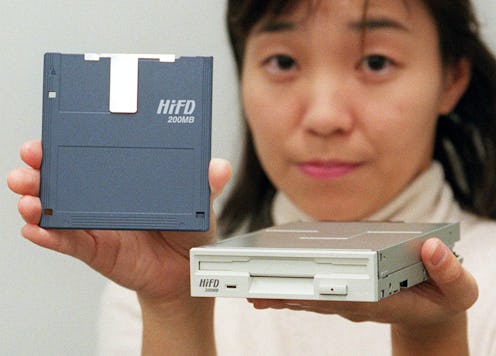News
"Floppy Disc" And "Nuclear" Should Not Go Together
"Nuclear" and "floppy disk": these are not two words that go together — especially not in 2016. And yet it would appear that our nuclear capability largely relies on a magnetic storage medium made obsolete many times over by CDs, USB drives, and now the greater cloud. Sure, we might not want the nuclear launch codes to be hackable to the same degree as naked selfies on iCloud, but running the U.S. nuclear program on 8-inch floppy disks cannot be the answer.
The Pentagon is still using several 1970s-era IBM computer systems that require the disks, according to a new report from the U.S. Government Accountability Office — which sometime in the 1990s dropped the ball on the whole accountability thing. The 8-inch disk is not even the one you're thinking of. The "modern" — and go big on the air quotes when reading this to your friends — floppy disk is just 3.15 inches.
To put this in perspective storage-wise, the 8-inchers, the super obsolete friends of the disks you remember, could only store 80 kilobytes when they were invented in the late 1960s. That means the disks that keep us from unintentionally launching an intercontinental ballistic missile at our enemies — or worse, our friends — does not even have enough storage space for a selfie taken with your original Motorola RAZR (with the one and only front facing camera).
More ridiculous still is how much the government spends maintaining outdated IT systems. The report says the government spends $60 billion a year, yes "billion" with a "B," to keep them going. Give Google 1 percent of that and there'd be an app made within a week — President Obama could start a nuclear armageddon from his iPhone (true, a possible Trump presidency makes that less funny — especially with his stubby fingers).
By the way, that cool $60 billion is 75 percent of all IT spending. "Development, modernization and enhancement" spending has actually decreased in recent years, despite the stated goal of upgrading several systems from the Pentagon to the IRS. As for the nuclear program, Lt. Col. Valerie Henderson, a Defense Department spokeswoman, said there's a reason:
This system remains in use because, in short, it still works. However, to address obsolescence concerns, the floppy drives are scheduled to be replaced with Secure Digital devices by the end of 2017. Modernization across the entire Nuclear Command, Control, and Communications (NC3) enterprise remains ongoing.
My 1991 Honda Civic worked. That did not keep me from needing to get gas every 200 miles on road trips when the fuel pump acted up. This was first reported by the media in 2014 during an episode of 60 Minutes. Sure, if it ain't broke, don't fix it. But upgrading? That's a whole other story.
